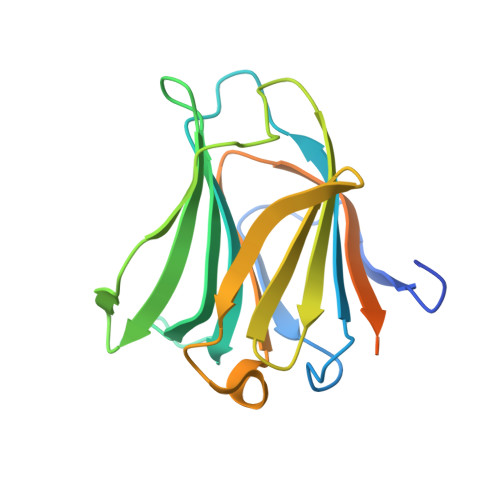Crystallization of Galectin-8 Linker Reveals Intricate Relationship between the N-terminal Tail and the Linker.
Si, Y., Wang, Y., Gao, J., Song, C., Feng, S., Zhou, Y., Tai, G., Su, J.(2016) Int J Mol Sci 17
- PubMed: 27973456
- DOI: https://doi.org/10.3390/ijms17122088
- Primary Citation of Related Structures:
5GZC, 5GZD, 5GZE, 5GZF, 5GZG - PubMed Abstract:
Galectin-8 (Gal-8) plays a significant role in normal immunological function as well as in cancer. This lectin contains two carbohydrate recognition domains (CRD) connected by a peptide linker. The N-terminal CRD determines ligand binding specificity, whereas the linker has been proposed to regulate overall Gal-8 function, including multimerization and biological activity. Here, we crystallized the Gal-8 N-terminal CRD with the peptide linker using a crystallization condition that contains Ni 2+ . The Ni 2+ ion was found to be complexed between two CRDs via crystal packing contacts. The coordination between Ni 2+ and Asp25 plays an indirect role in determining the structure of β-strand F0 and in influencing the linker conformation which could not be defined due to its dynamic nature. The linker was also shortened in situ and crystallized under a different condition, leading to a higher resolution structure refined to 1.08 Å. This crystal structure allowed definition of a short portion of the linker interacting with the Gal-8 N-terminal tail via ionic interactions and hydrogen bonds. Observation of two Gal-8 N-terminal CRD structures implies that the N-terminal tail and the linker may influence each other's conformation. In addition, under specific crystallization conditions, glycerol could replace lactose and was observed at the carbohydrate binding site. However, glycerol did not show inhibition activity in hemagglutination assay.
- Jilin Province Key Laboratory on Chemistry and Biology of Natural Drugs in Changbai Mountain, School of Life Sciences, Northeast Normal University, Changchun 130024, China. siyl071@nenu.edu.cn.
Organizational Affiliation:




















